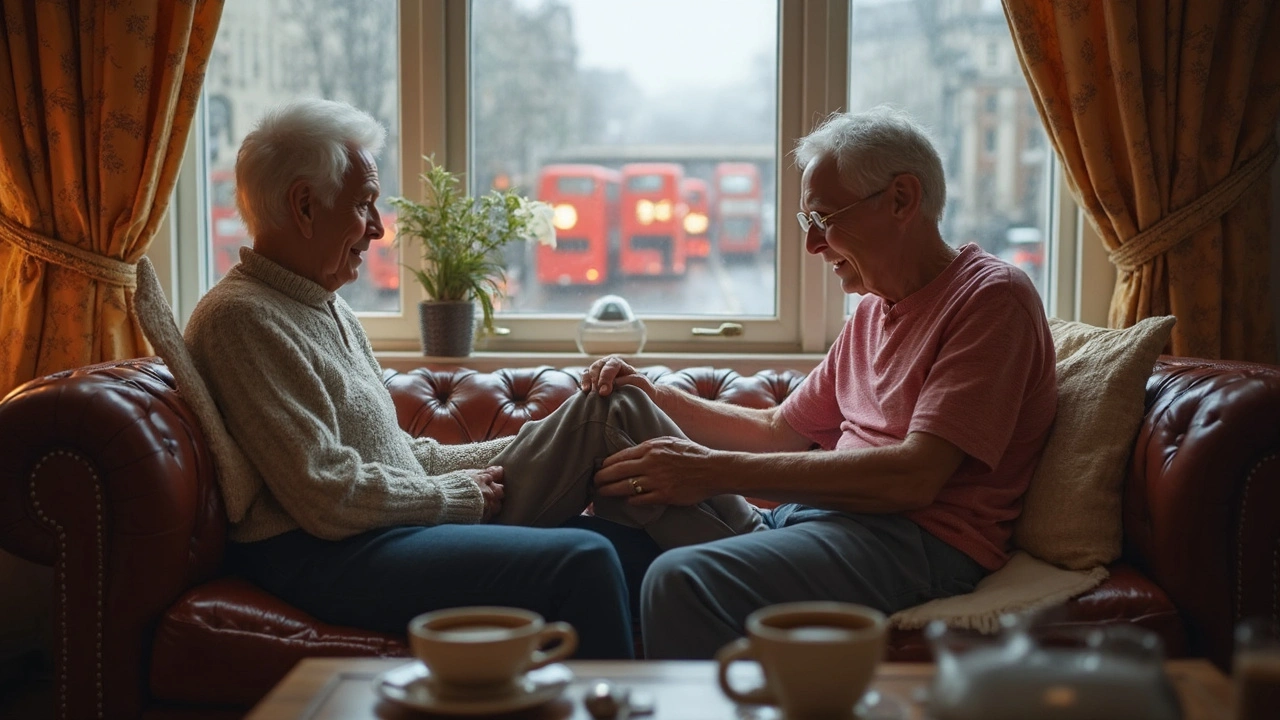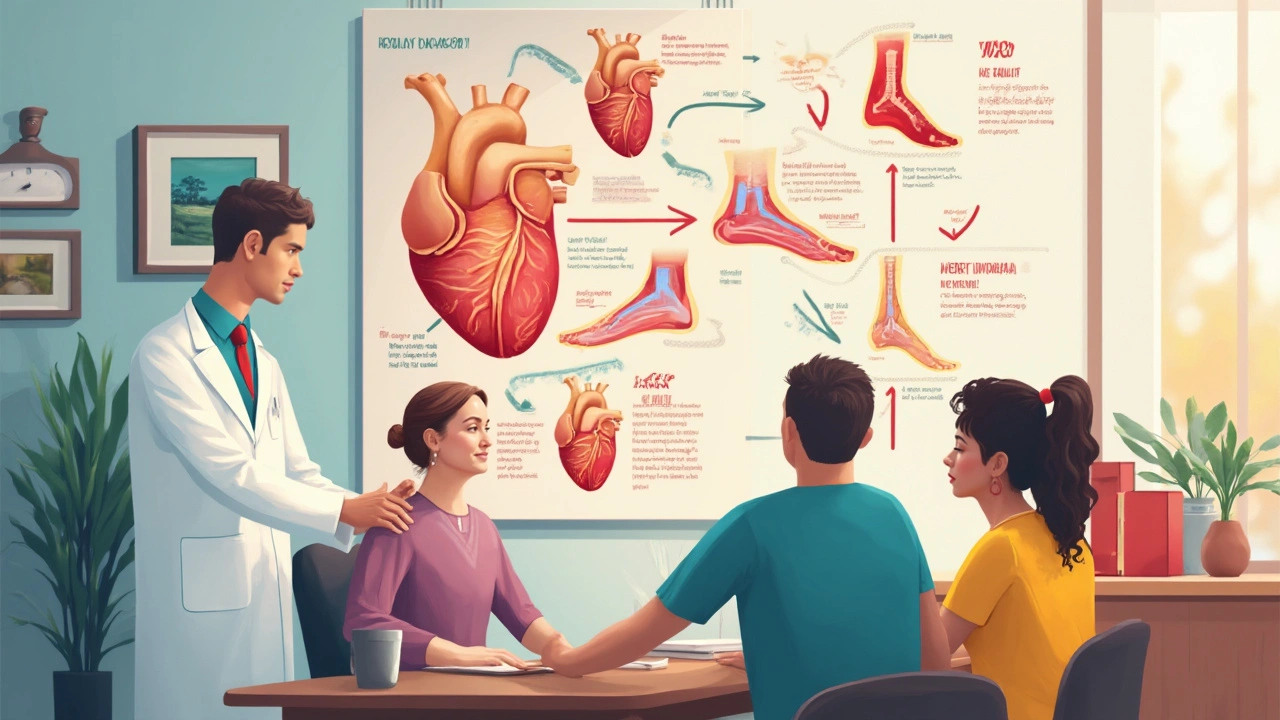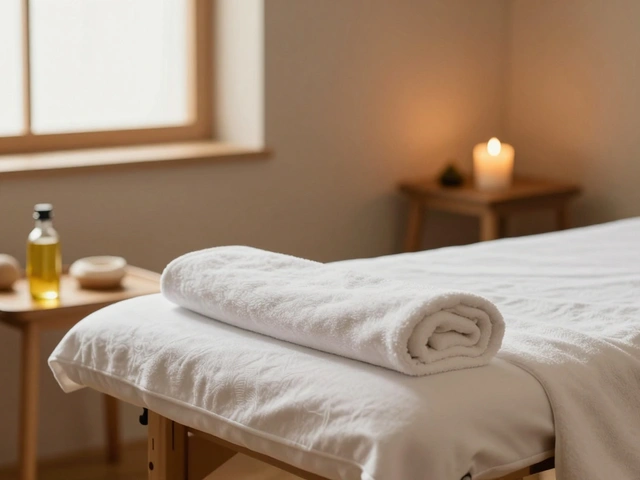Foot Massage Benefits for Heart Health: What Science Reveals

Ever thought a simple foot rub could be the secret to a healthier heart? Most people see foot massages as a luxury or an extra—they're what you get at a spa or beg a partner for after a long day. But science is starting to say something wild: the humble foot massage might actually help keep your heart in better shape. We’re talking about more than just comfort here. There’s a surprising connection between what happens down at your feet and your heart’s health up in your chest, and it’s worth peeling back the layers to see what’s going on.
The Science Behind Foot Massage and Circulation
Let’s get real for a second—the heart and feet are separated by a six-foot hike, and nobody really thinks about how much work your heart does to reach all the way down there. Every step you take, your heart pumps blood down—and back up—through your legs and feet. That’s a lot of territory to cover. What you might not realize is how foot massage can actually boost this process. When you knead and put pressure on different parts of your feet, you’re actually triggering blood vessels to open up (a process called vasodilation). This helps more oxygen-rich blood travel back up toward your heart. The result? Lower workload for the heart, and better delivery of oxygen and nutrients all over your body.
A small but solid study out of Denmark in 2022 showed that people with mild high blood pressure who got a daily 10-minute foot massage had an average drop in systolic blood pressure of around 5 mmHg after six weeks. Doesn’t sound huge? It is—enough to nudge your heart from “struggling” to “running smoother.” In the same study, folks mentioned feeling less tension in their chest and a calm that often lasted hours after a session.
Another big piece of the puzzle: your feet are packed with nerve endings—about 7,000 in each foot. These are nowhere near as idle as we sometimes imagine. When a therapist, or even you yourself, work on those nerve endings, signals scream up your nervous system, telling your blood vessels to relax. The magic here is real, and you don’t need expensive gear to get it started.
| Benefit | Result from Foot Massage |
|---|---|
| Blood Pressure | Reduced by 3-5 mmHg on average over 6 weeks |
| Resting Heart Rate | Decreased by up to 8 beats per minute post-massage |
| Perceived Stress | 30% drop in self-reported stress markers |
Regular stimulation through foot massage is now being trialed for patients with chronic artery disease. Doctors are hopeful—there may be yet more ways to help hearts work less and live longer.
The Heart–Mind–Foot Connection: Stress, Hormones, and Reflexes
You know how your whole body can feel tense after a bad day? The stuff that tenses your shoulders—work emails, family stress, just life—can clamp down on your arteries too. Your heart hates stress. Here’s where foot massage steps in. There’s a reason some clinics offer massage chairs for cardiac patients before tests—it’s not just marketing fluff.
During a decent foot massage, your brain releases more endorphins, as well as serotonin. Both are shown to lower your stress hormone cortisol—and this is big news for your heart. Stress keeps your blood pressure up, throws off your heartbeat, and means your heart has to push harder with each pump. Less cortisol means more chill, and more chill means healthier blood vessels. When your body relaxes, tiny arteries open wider, and you get better blood flow. Foot massage basically tells your whole nervous system to hit the brakes and cool it, sending real signals up through your body.
To put it simply: your feet and your mind talk more than you’d think. There’s a reason traditional Chinese medicine has been onto foot reflexology for over 2,000 years. Modern researchers at Michigan State University found that a single 15-minute foot massage helped lower stress-related markers in women recovering from heart surgery. Patients felt better, slept better, and even used less pain medication. That’s not just a placebo effect—it’s the body listening and responding.
“We observed significant reductions in reported anxiety and physiological stress markers after only one week of daily foot massage. The implications for post-cardiac event recovery could be massive.” — Dr. Susan Hall, lead investigator, Cardiovascular Recovery Unit, MSU
Nerves in your feet are hooked into something called the parasympathetic nervous system—the chill-out network of your body. A good massage turns this on, which means less sweat, slower breathing, and a slower, steadier heart. No magic, just basic human wiring. You can try this at home by giving yourself a foot massage before bed if your stress is off the charts. Try a tennis ball under your foot and roll it with a little pressure—it’s a mini massage that takes no skill, and people swear by the instant effect on their mood.

Easy Ways to Try Foot Massage at Home
Let’s get practical. You don’t need fancy oils, a diploma, or spa music to give your feet (and your heart) a shot at good health. Here’s the routine I use after running or a drag of a work week. Grab a towel, some moisturizer or basic oil (coconut oil works well), and set aside 10 minutes. Even five makes a dent if you’re short on time.
- Warm-Up: Start by soaking your feet in warm water for a few minutes. This softens skin and relaxes tight muscles. If you’re tight on time, just rub briskly to warm up your feet instead.
- Start with the Sole: Using your thumbs, press in small circles from your heel up toward your toes. Go slow and put real pressure as you move—don’t just skim the surface. Spend at least one minute per foot here.
- Arch Focus: With one hand bracing the heel, use the other thumb to press along your foot arch, from the ball of your foot toward the heel. You might feel sensitivity in the middle—these are often tension points. Hold gentle pressure on any tight spots.
- Toes Care: Don’t skip toes. Pinch and gently pull each toe. Rub between them. Gets the blood flowing to all those tiny capillaries that rarely get much love.
- Ankle Circles: Hold your ankle with one hand. Use the other to rotate your foot, gently stretching your joints. This also boosts blood flow, helping to move any fluid that’s pooling at the end of the day.
If you want to go a step further, grab a massage roller or a small ball. Roll your foot over it with pressure, focusing on the arch. Fifteen minutes a day can make a big difference not just to your feet, but your mindset and, yes, your heart.
There are also simple routines based on reflexology, which aim to hit certain pressure points believed to link to heart and lung health. For instance, the reflexology point for the heart sits right under your left foot, a little below the base of your big toe, toward the arch. Pressing here for sixty seconds a few times a week is said by some therapists to have a calming, heart-friendly benefit. You might not see this show up in a blood test, but lots of people insist their tension drops after focusing on this spot.
If you struggle with conditions like plantar fasciitis, be gentle and consider talking to a podiatrist first, but most people can jump right in. And if you can rope in a partner, swapping foot rubs is a solid way to build connection (bonus: lower anxiety for both of you).
What Do the Experts Say? Foot Massage in Modern Medicine
Doctors normally don’t reach for a bottle of oil before prescribing blood pressure meds, but there’s a shift happening. Hospitals in Japan and parts of Scandinavia now include short foot massage sessions for heart surgery patients and folks with high blood pressure or anxiety. Less medication needed, faster recovery, and happier patients are driving this small but growing trend.
Cardiologists in the UK have pointed out that foot massage is a low-risk, near-zero-cost therapy with almost no downside. Dr. Hannah Rowe, a consultant in London, said on the BBC in 2023:
“We often overlook basic touch as a tool. Thirty years ago, hand-washing before surgery seemed simple too. Small things add up. For some patients, ten minutes with a foot therapist makes more difference than an extra pill.”
Let’s be real—foot massage isn’t going to replace statins anytime soon. For folks with severe artery blockages or advanced heart failure, it’s one tool among many. But for most people, especially those with mild high blood pressure, anxiety, or who sit (or stand) all day, it’s a safe way to help take some daily pressure off the heart.
The National Institutes of Health ran a review in 2024 summarizing evidence from 15 studies. They found foot massage could lower resting heart rate by up to 8 beats per minute in adults under moderate stress, and reduced nighttime blood pressure in folks over age 50. Side effects? None reported in healthy adults, except for very rare soreness if too much pressure/force was used.
Expert tips for making the most of foot massage at home include:
- Use a circular motion for the arch and heel, which seems to improve blood flow best.
- Drink a glass of water after a session; this helps flush any released toxins (and keeps you hydrated).
- If you have diabetes, neuropathy, or severe swelling, check with your doctor before starting regular massages.
Bottom line: heart health sees small but real payoffs in regular foot care. As more clinics bring massage into cardiac rehab, it’s getting harder to brush off this ancient trick as merely pampering. Even the busiest heart specialist will admit: we could all use more reasons to take our shoes off and give our feet a little attention—especially if our heart stands to benefit.
If you’re after one healthy habit that’s dead simple, costs almost nothing, and might just help both your feet and your heart, well, you know what to do tonight. Massage, relax, repeat.


